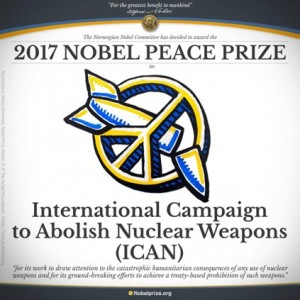
The Treaty on the Prohibition of Nuclear Weapons (TPNW) opened for signature at the United Nations on 20 September 2017 and entered into force on 22 January 2021. Ninety-four states are current signatories, and seventy-three nations have now ratified the TPNW; the Holy See was the first. The United States, which has not yet signed, should take a lead role in bringing all nine nuclear nations to the TPNW table – we owe it to humanity.
"We must never grow weary of working to support the principal international legal instruments of nuclear disarmament and nonproliferation, including the Treaty on the Prohibition of Nuclear Weapons."
~ Pope Francis, November 2019, in Japan
"With deep conviction I wish once more to declare that the use of atomic energy for purposes of war is today, more than ever, a crime not only against the dignity of human beings but against any possible future for our common home. The use of atomic energy for purposes of war is immoral, just as the possessing of nuclear weapons is immoral . . . . We will be judged on this."
~ Pope Francis, Address to the Meeting for Peace at Hiroshima, 24 November 2019
2024 Nobel Peace Prize
The 2024 Nobel Peace Prize was awarded to Nihon Hidankyo (Japan Confederation of A- and H-Bomb Sufferers Organizations) "for its efforts to achieve a world free of nuclear weapons and for demonstrating through witness testimony that nuclear weapons must never be used again." The group was established in 1956 by survivors of the atomic bombings of Hiroshima and Nagasaki.
The Nobel Peace Prize Lecture was delivered on 10 Dec 2024 by Terumi Tanaka, the Nihon Hidankyo Secretary-General, who was 13 years old in Nagasaki when the U.S. used an atomic bomb on the city. One can watch the peace prize award ceremony on YouTube here, and/or read a transcript of his inspiring lecture here.
The International Campaign to Abolish Nuclear Weapons (ICAN) issued a statement congratulating Nihon Hidankyo on its receipt of this honor. ICAN itself received the Nobel Peace Prize in 2017, as shown in the image above.
One can also watch here the 51-minute “special order” session of the U.S. Congress on 13 November 2024, during which Members of Congress discussed the importance of disarmament and arms control in an era of increased nuclear danger.
“Living in the Light of Christ's Peace: A Conversation Toward Nuclear Disarmament” – a pastoral letter by Archbishop John Wester
In January 2022, Archbishop John Wester of Santa Fe, New Mexico, issued a pastoral letter, "Living in the Light of Christ's Peace -- A Conversation Toward Nuclear Disarmament." Archbishop Wester was inspired to write the letter after visiting museum exhibits in Japan about the 1945 atomic bomb attacks in Hiroshima and Nagasaki. With those exhibits still horrifically present in his consciousness, he came home from Japan to Santa Fe and visited the New Mexico History Museum exhibit about the Manhattan Project in the Los Alamos and Sandia National Laboratories. He saw photos of the actual Hiroshima and Nagasaki bombs “Little Boy” and “Fat Man.” The juxtaposition of his two experiences dismayed him. He wrote:
"When my friends and I stepped outside into our beautiful city, I noticed how peaceful it was. Santa Fe – the City of the Holy Faith of St. Francis of Assisi, a faith which inspired him to be an instrument of Christ’s peace to the world – is home to Nuestra Señora de la Paz, Our Lady of Peace. I felt disturbed by our history, the long, dark legacy of building the Hiroshima and Nagasaki bombs, and many thousands of nuclear weapons since then. We are the people who designed and built these weapons of mass destruction. We were the first to use them. We must be the people to dismantle them and make sure they are never used again.
“That day in Santa Fe, it seemed blasphemous to me that we could create a weapon with the potential to destroy our entire planet, our common home, given to us by a loving God to be cared for and nurtured so that all might live in God’s peace. It became clear to me that the Archdiocese of Santa Fe must be part of a strong peace initiative, one that would help make sure that these weapons would never be used again, that we would never destroy our planet or one another, that instead we would clean up our poisoned land and fund global institutions that resolve all international conflicts through nonviolent means such as dialogue and negotiation." (Living in the Light of Christ’s Peace, page 6)
Calling attention to what popes have said about nuclear weapons proliferation, Archbishop Wester also wrote:
"On November 24, 2019, Pope Francis visited Hiroshima and Nagasaki, and met with atomic bomb survivors and prayed for nuclear disarmament. He spoke passionately about the 'black hole of death and destruction' that nuclear weapons could cause today and called for a 'world without nuclear weapons.' He added, 'The use of atomic energy for purposes of war is today, more than ever, a crime not only against the dignity of human beings but against any possible future for our common home. . . . The use of atomic energy for purposes of war is immoral, just as the possession of atomic weapons is immoral.'” (page 9)
"Pope Benedict XVI, for his World Day of Peace Message on January 1, 2006 entitled In Truth, Peace, addressed nuclear weapons and the sense of false security they provide. He said, 'How can there ever be a future of peace when investments are still made in the production of arms and in research aimed at developing new ones? It can only be hoped that the international community will find the wisdom and courage to take up once more, jointly and with renewed conviction, the process of disarmament, and thus concretely ensure the right to peace enjoyed by every individual and every people.'" (page 12)
"Jesus rebuked the disciples because they wanted to call down fire from heaven. He absolutely forbids even the thought of it. He rejects violence of all kinds, including retaliation and warfare. He will not tolerate it among His followers. Jesus wants us to be as nonviolent and loving as He is, come what may. We are not allowed to kill people. (page 16)
Addressing the history of the United States in connection with nuclear bombs, Archbishop Wester writes:
"Pope Francis has been unequivocally clear: 'The possessing of nuclear weapons is immoral.' In the past, the Vatican took the position that the possession of nuclear weapons could be justified for the purpose of 'deterrence' in preventing others from using them. However, in [2014], the Holy See declared that:
"'. . . it must be admitted that the very possession of nuclear weapons, even for purposes of deterrence, is morally problematic. While a consensus continues to grow that any possible use of such weapons is radically inconsistent with the demands of human dignity, in the past the Church has nonetheless expressed a provisional acceptance […] under the condition that this be "a step on the way toward progressive disarmament." This condition has not been fulfilled -- far from it.'" (page 19)
"There is a widespread debate among historians about why the United States dropped the atomic bomb in the first place. . . . Indeed, many key people in the Truman Administration were against the atomic bombing and knew they did not need to drop these horrific bombs to end the war. Instead, some historians now claim the U.S. dropped these weapons of mass destruction on Hiroshima and Nagasaki not to end the war, but to prove to the Soviets that the United States was militarily superior, thus beginning the nuclear arms race. Indeed, some historians now suggest it was not until the early 1950s that the War Department created the myth 'the atomic bomb saved lives,' and that it prevented the possible death of one million Americans who might have died in an invasion that November. That myth remains widespread today and needs to be discussed." (page 20 and footnote 28, page 49)
On many occasions, the Holy See has declared that the money spent on the proliferation of nuclear weapons is money that should have been spent instead on the welfare of vulnerable citizens in our world. Archbishop Wester again quotes Pope Francis on U.S. spending for nuclear weapons:
"In 2019, Pope Francis declared:
"'Here in this city [Nagasaki] which witnessed the catastrophic humanitarian and environmental consequences of a nuclear attack, our attempts to speak out against the arms race will never be enough. The arms race wastes precious resources that could be better used to benefit the integral development of peoples and to protect the natural environment. In a world where millions of children and families live in inhumane conditions, the money that is squandered and the fortunes made through the manufacture, upgrading, maintenance and sale of ever more destructive weapons, are an affront crying out to heaven.'
"In light of these statistics and realities, I agree with Pope Francis and many others that the time has come to commit ourselves globally to the complete abolition of nuclear weapons. We should end all these massive financial investments for building and maintaining these weapons of mass destruction – investments which make only a few individuals and corporations enormously wealthy – and instead invest those massive funds in education, healthcare, environmental cleanup, addressing the climate threat, rebuilding our infrastructure, and providing vaccinations for everyone everywhere against future pandemics. With those funds, we could end poverty and hunger . . . ." (page 30)
At the end of his pastoral letter, Archbishop Wester writes about how to move forward toward nuclear disarmament:
"I invite everyone in New Mexico and across the nation to join this conversation about the urgent need for nuclear disarmament. I invite us to pray together, study together, dialogue together, and take concrete steps together that we might cut back and soon abolish our nuclear weapons. . . .
"We can agree there must be a massive comprehensive cleanup of the Los Alamos National Laboratory. That would be a real win-win for New Mexicans, providing hundreds of well-paying jobs for decades while permanently protecting the environment and ground water.
"We can agree those with the expertise at the Los Alamos and Sandia National Laboratories could stop work on nuclear weapons development and instead begin the long, technical process of dismantling the weapons; planning for a world with multilateral verifiable nuclear disarmament; and verifying that the world’s nuclear weapons are gone, never to reappear. Nonproliferation programs at both the Los Alamos and Sandia National Laboratories should focus on and prioritize advanced technologies for the remote sensing, accounting, and monitoring of nuclear weapons and materials that will enable a future world free of nuclear weapons. Improved verification technologies will be needed to support future arms control treaties. The design expertise of both labs will always be needed for the dismantling and disposal of existing nuclear weapons. All of these technical means are necessary to underpin a verifiable, future world free of nuclear weapons while providing high-paying jobs into the future.
"We can agree catastrophic climate change is now a real national security threat, and even more, a real global security threat. Transferring the billions of dollars spent on nuclear weapons production and maintenance to prevent further environmental destruction and loss of life should become the primary focus of our national and global work. As Pope Francis states in his 2015 Encyclical, Laudato Si’: On Care for Our Common Home, 'climate change is a global problem with grave implications: environmental, social, economic, political and for the distribution of goods. It represents one of the principal challenges facing humanity in our day.'" (pages 32-33)
“Back from the Brink” Campaign
Many states and municipalities have adopted a “Back from the Brink” resolution, calling on the U.S. to lead a global effort to prevent nuclear war by: (a) actively pursuing a verifiable agreement among nuclear-armed states to eliminate their nuclear arsenals; (b) renouncing the option of using nuclear weapons first; (c) ending the sole, unchecked authority of any U.S. President to launch a nuclear attack; (d) taking U.S. nuclear weapons off hair-trigger alert; and (e) cancelling the plan to replace (at great expense) the entire U.S. nuclear arsenal with enhanced weapons. For more information, see https://preventnuclearwar.org.
Additional Resources
U.S. Conference of Catholic Bishops, Backgrounder on Nuclear Disarmament and Challenging Military Spending (January 2020)
“Nuclear Disarmament: Seeking Human Security,” Joint Declaration of U.S. and European Catholic Bishops (July 2017)
Papal Address to Participants in the International Symposium “Prospects for a World Free of Nuclear Weapons and for Integral Disarmament” (November 2017)
Pax Christi International, “Catholic Morality and Nuclear Abolition” (March 2015)
"Nuclear Disarmament: Time for Abolition," A Contribution of the Holy See to the Vienna Conference on the Humanitarian Impact of Nuclear Weapons (December 2014)
Image from Flickr, licensed under CC BY-NC-ND 2.0.



